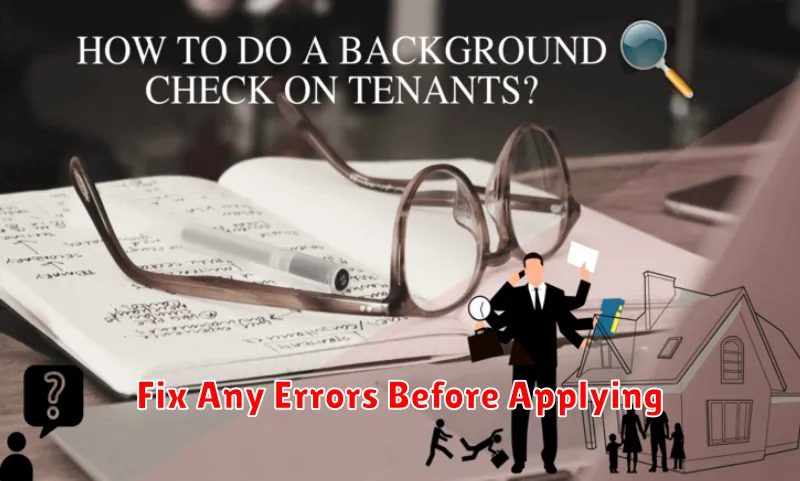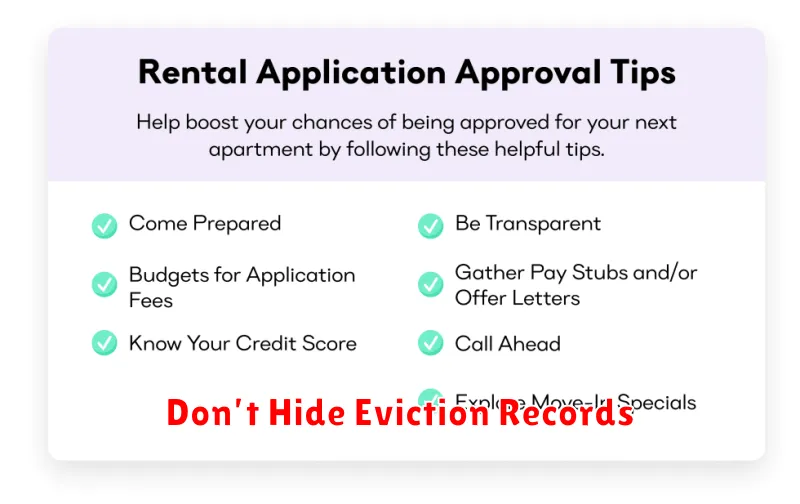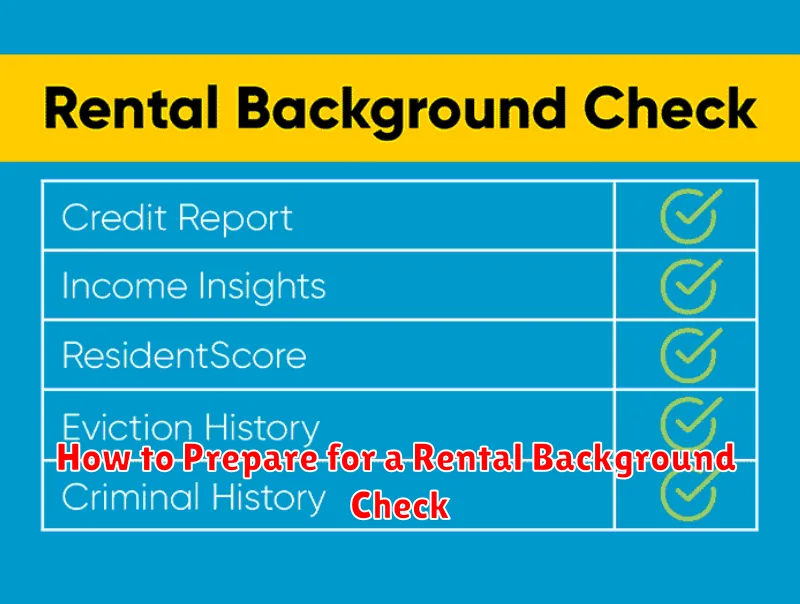Are you preparing to rent an apartment, house, or condo? A rental background check is a crucial step in the application process. Landlords use these checks to assess potential tenants and ensure they are responsible and reliable. Understanding how to prepare for a rental background check can significantly increase your chances of securing the property you desire. This article will provide valuable insights and practical steps you can take to be fully prepared for a rental background check, covering key areas like credit reports, rental history, criminal background, and income verification.
Taking proactive steps to address potential issues before applying can improve your prospects considerably. A strong rental background check can make you a more competitive applicant and improve your standing with prospective landlords. This guide will equip you with the knowledge and resources to present yourself in the best possible light, increasing your chances of a successful rental application. Learn how to navigate the rental background check process with confidence, from understanding what landlords look for to gathering necessary documentation. Be prepared and put your best foot forward in the competitive rental market.
What Landlords Check in Background Reports
Landlords use background checks to assess potential tenants. These reports help them make informed decisions about who they rent to. Credit reports are a key component, revealing your credit history and score, which indicates your financial responsibility. Landlords also look at your rental history, seeking references from previous landlords to gauge your reliability as a tenant.
Criminal background checks are also standard practice, helping landlords ensure the safety and security of their property and other tenants. These checks typically look for serious offenses. Finally, many landlords verify your employment and income to ensure you can afford the rent. This often involves contacting your employer and reviewing pay stubs or bank statements.
Check Your Own Report First
Before a landlord runs your background check, it’s highly recommended that you run one yourself. This allows you to identify any inaccuracies or negative marks that might be present. Knowing what’s in your report beforehand helps you prepare an explanation for potential landlords.
You can obtain your report from various consumer reporting agencies. Review it carefully for errors like incorrect addresses, outdated information, or mistaken identity. If you find any errors, dispute them with the agency immediately.
Common issues to look for include:
- Credit report errors (incorrect balances, late payments)
- Criminal record inaccuracies (misdemeanor vs. felony)
- Eviction history discrepancies (incorrect dates, reasons)
Fix Any Errors Before Applying

A crucial step in preparing for a rental background check is addressing any potential inaccuracies in your records. Proactively reviewing your credit report is highly recommended. Look for any errors related to late payments, collections, or incorrect personal information. Disputing these errors with the credit bureaus before applying can significantly improve your chances.
In addition to your credit report, consider your criminal background. If there are any inaccuracies or discrepancies, take steps to address them immediately. Contact the relevant courts or agencies to ensure the information is accurate and up-to-date. This proactive approach shows responsibility and minimizes potential issues during the screening process.
Be Honest About Your History
Landlords conduct background checks to assess risk. Being upfront about any prior evictions, criminal records, or credit issues is crucial. Attempting to hide these details will likely backfire. Most background check services are thorough, and discovering discrepancies between your application and the report will raise red flags.
Honesty builds trust. While a less-than-perfect history might not automatically disqualify you, dishonesty will. Explain any negative information briefly and factually. If you’ve taken steps to address past issues, such as paying off debts or attending anger management courses, highlighting these proactive measures can demonstrate your commitment to responsible tenancy.
Prepare Documentation
A crucial step in preparing for a rental background check is gathering the necessary documentation. Having these readily available will expedite the process and demonstrate your preparedness to potential landlords. Key documents often required include:
- Proof of Identification: A valid driver’s license, passport, or state-issued ID.
- Proof of Income: Pay stubs, tax returns, or bank statements verifying your financial stability.
- Rental History: Contact information for previous landlords, demonstrating a positive rental track record.
Organizing these documents beforehand will ensure a smooth and efficient application process.
Inform References Ahead of Time
Giving your references a heads-up is a crucial step in preparing for a rental background check. It allows them to be prepared and provide thoughtful responses when contacted by the landlord or property manager. This proactive approach demonstrates your organization and respect for their time.
Inform your references about the upcoming background check, specifying who might be contacting them (e.g., landlord’s name or property management company). Briefly explain what kind of information might be requested, such as your rental history, employment verification, or personal character assessment.
Don’t Hide Eviction Records

While it might be tempting to try and conceal past evictions, it’s generally not a good strategy. Background checks often reveal eviction records, and attempting to hide them can appear deceptive to a potential landlord. This can significantly hurt your chances of securing a rental.
Instead, be proactive. If you have an eviction on your record, gather any documentation that provides context or demonstrates a resolution, such as proof of paid settlements or letters of recommendation from previous landlords. Being upfront and providing an explanation demonstrates responsibility and can mitigate the negative impact of the eviction record.
Be Ready to Explain Red Flags
A background check might reveal information that could be perceived negatively by a landlord. Be prepared to proactively address any potential concerns. This demonstrates responsibility and transparency.
Common red flags include a poor credit history, prior evictions, or criminal records. Having a concise explanation ready can significantly improve your chances. For example, if you experienced a period of unemployment that affected your credit, be prepared to document the situation and explain your current financial stability. If you had a past eviction due to extenuating circumstances, gather supporting documentation if possible.
Honesty is crucial. Attempting to hide information will likely backfire. Landlords appreciate applicants who are upfront about their past and demonstrate a willingness to take responsibility.
Get Pre-Approved if Possible
Getting pre-approved for a rental can significantly strengthen your application. This process involves submitting your application, including a background and credit check, before actively searching for a property.
A pre-approval letter demonstrates to landlords that you are a serious and qualified applicant. It shows that you’ve already cleared the necessary checks and are ready to move forward, giving you a competitive edge over other potential renters. This can be especially helpful in competitive rental markets.
While not all landlords or property management companies offer pre-approval, it’s worth inquiring about. It can save you time and effort in the long run and increases your chances of securing your desired rental.
Maintain a Clean Online Presence
Your online presence can significantly impact your rental application. Landlords often screen potential tenants by searching their names online. A clean digital footprint can help present you as a responsible and respectable candidate.
Review your social media profiles. Ensure your posts, photos, and comments reflect positively on your character. Consider privatizing or deleting anything questionable. Check your privacy settings to control who can see your content.
Monitor your online reputation. Search for yourself online to see what information is publicly available. Address any negative content if possible. Building a positive online presence can be as simple as engaging in respectful online discussions and contributing to online communities.

